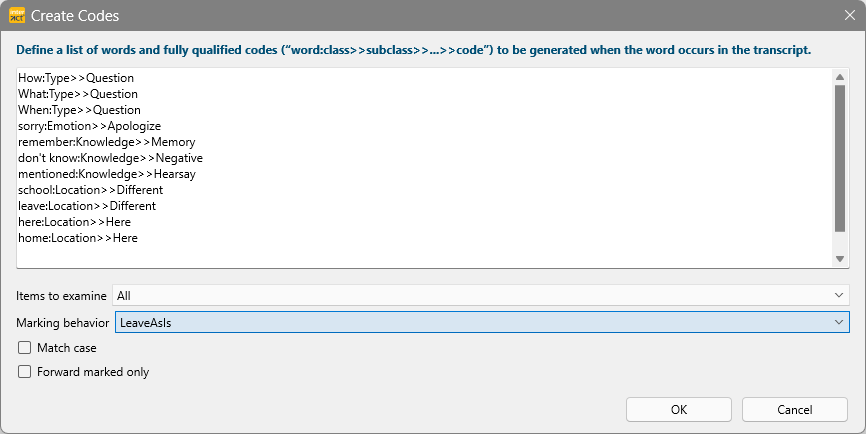This routine enables us to 'automatically' code Events, based on the content of their transcriptions.
The power of this data module is demonstrated in the Demo Workflow Create Codes from Transcript, available through Start - File - Open > Demo > Workflows > Workflow: Create Codes from Transcript.
In this workflow, a number of specific trigger words are predifined in a way that whenever found in a transcription, corresponding Codes are added to label that specific Event.
The syntax for this module looks like this:
YourTriggerWord:YourClass>>YourCode
In this example, all events for which the transcription contains the words 'How', 'What', or 'When' are labeled with the Code 'Question' in the Class 'Type':
How:Type>>Question
What:Type>>Question
When:Type>>Question
sorry:Emotion>>Apologize
remember:Knowledge>>Memory
don't know:Knowledge>>Negative
mentioned:Knowledge>>Hearsay
school:Location>>Different
leave:Location>>Different
here:Location>>Here
home:Location>>Here
For the other words, different Codes are used. If multiple 'trigger' words are used in a single transcription event, multiple labels will be applied.
Settings
The GUI of this Data Module within the Workflow Editor looks like this:
▪Right-click the Module and select Settings from the context menu.

On the demo file, the workflow results look something like this:
Basic Properties
All relevant Basic Properties are part of the Create Codes from Transcript dialog:
Items to examine:
oItems to examine |
Determines whether all lines are used in the current module or only the selected lines (those with a green dot in front of them): oAll : This module uses all data, existing Events and new lines created by the previous workflow modules. oMarkedOnly : This module uses only the currently selected Events. oNotMarkedOnly : This module uses only the currently NOT selected Events |
Marking behavior:
oMarking behavior |
Determines how the line selection should be handled during the routine: oLeaveAsIs : This module does not change the current selection of Events. oUnmarkAll : This module clears any available selection oMarkAll : This module selects all currently available Events oMarkNewOnly : This module clears any previous selections and selects only the data resulting from its own operation. oKeepExistingAndMarkNew : This module keeps the previous selection and adds the data resulting from its own operation to the selection. |
Check boxes:
oMatch case |
Determines whether the case of the characters should be taken into account: False : all occurrences of the searched for characters are fou True : only occurrences that match the specified case are found. |
oForward marked Only |
Determines whether all lines are forwarded to the next module or only the current selection (those with a green dot in front of them): oFalse : This module forwards all data to the next module. oTrue : This module forwards only currently selected Events to the next module. If no Events are selected, all Events are used. |
